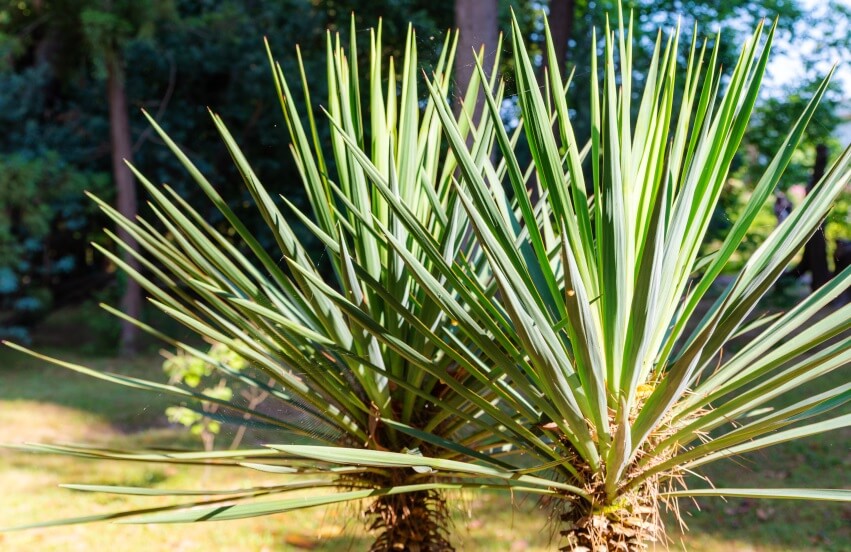Yucca plants bring both style and simplicity to gardens, their sword-like leaves adding a unique touch. Native to arid regions, these plants have a rich history in traditional medicine. Yucca plant’s fruit, flowers, seeds, leaves, and bark held significance for Native Americans, serving both medicinal and practical uses. And just to clarify, these are not the yuca or cassava plants used in Latin American cuisine! Our focus in this article will be on exploring the nutritional value, side effects and many benefits of Yucca plants.
If you are interested in this topic, you can also read
<<Bacopa Monnieri Benefits>> and <<Loquat Trees Benefits>> articles.
Yucca Schidigera
About Yucca Plant
The Yucca plant is a member of the Asparagaceae family of plants, which also includes 40 to 50 other species with therapeutic uses. Typically, these plants are found in dry areas of the Southwestern United States and Mexico, such as the sandy dunes, coastal sections of California, Baja California, Mojave, Sonoran, Colorado, and Chihuahuan Deserts. These plants are valuable for many practical uses, but they also hold a special position in traditional medicine. Yucca is a useful desert plant that has been recognized by indigenous people, who refer to it as the “tree of life” due to its health-promoting qualities [1].
Yucca Nutritional Value
Indeed, Yucca is a treasure trove of various compounds, including:
- Saponins
- Phenolic compounds
- Yuccaols A, B, C, D, and E
- Furostanol and spirostanol aglycone
- Sarsasapogenin
- Markogenin
- Tigogenin
- Neo-tigogenin
- Neo-gitogenin
- Hecogenin
- Gloriogenin
- Vitamin C
- Vitamin B
- Vitamin A
- Calcium
- Phosphorus
- Potassium
- Iron
These compounds contribute to the diverse and beneficial properties of Yucca, from its medicinal uses to its potential in various other applications [1].
Yucca Gloriosa
Benefits Of Yucca Plant
According to traditional folk medicine, yucca extracts are thought to have both anti-arthritic and anti-inflammatory effects. Native Americans, drawing from their traditional healing practices, used this plant to treat various ailments, with arthritis being one of them. Today, yucca products continue to be applied in different contexts, suggesting a sustained interest in exploring their potential therapeutic benefits. Some of the most significant therapeutic benefits of yucca plants are as below:
Anti- Inflammatory Effect
The Yucca plant contains a wealth of natural compounds that have significant physiological effects. Steroid-derived saponins, which are abundant in Yucca, are one of the noteworthy chemicals. In fact, Yucca schidigera can have up to 10% of these steroidal saponins in its dried stems, making it one of the best natural sources of these compounds that are used in various products. These saponins found in Yucca have a wide range of useful properties in the world of biology and health [2].
Anti-Cholesterol
When people with high cholesterol levels consume Yucca extracts in their diet, something interesting happens. These extracts can actually lower the overall cholesterol levels, especially the “bad” LDL cholesterol. This happens because the saponins in Yucca bind to the cholesterol that your body gets rid of through bile. This binding process stops the cholesterol from going back into your system, essentially preventing it from recycling in your body, which is why it helps lower cholesterol levels [3].
Cutting yucca leaf
Anti-Protozoal Activity
Saponins, those special compounds from the Yucca plant, have a wide range of effects on our bodies. One interesting thing they can do is fight against tiny parasites called protozoa. Saponins have been proposed as a potential treatment for arthritis since they regulate these protozoa. Additionally, saponins also have anti-inflammatory properties, which means they can help reduce swelling and discomfort in the body [4].
In Mexico, a significant health concern is a condition called human Giardiosis, which affects the intestines and can be quite common. In fact, it’s estimated that as many as 68% of the population may experience this condition. Giardiasis is caused by a type of parasite known as Giardia lamblia, and it involves stages of its life cycle taking place in the gastrointestinal tract.
Now, the good news is that saponins, like those found in Yucca, can help combat this problem. They have anti-protozoal properties, which means they can fight against these parasites. In fact, Yucca saponins are so effective that they can be just as good as a medication called metronidazole in killing off the harmful Giardia lamblia parasites right in the intestines. This is a promising discovery for managing this health issue [5].
Anti-Cancer And Rheumatism
Saponins, including those found in the Yucca plant, can have some exciting properties when it comes to cancer treatment. They’ve been demonstrated to boost the effectiveness of certain drugs used to fight cancer, making them more potent against cancer cells.
Furthermore, the well-known anti-inflammatory chemical cortisone can be produced from the steroidal saponins present in various portions of the Yucca plant. That’s why some people think that utilizing remedies based on Yucca leaves them pain-free, and others have even reported experiencing pain relief in the case of rheumatism and arthritis[1].
For many years, Yucca-based products have been relied upon for their potential anti-arthritic benefits. Native Americans used them for this purpose, and more recently, the nutraceutical industry has followed suit. In fact, it’s common to find Yucca plant powder in tablet form as a popular nutraceutical. There’s even a famous study that found positive results. It reported that people suffering from arthritis experienced relief from symptoms like pain and swelling after taking Yucca tablets. This is an encouraging sign of the plant’s effectiveness in addressing arthritic discomfort [6].
Flowering Yucca plant
Anti-Diabetic
In a scientific study, researchers looked at how Yucca schidigera, Quillaja Saponaria, and a combination of both plants could impact rats with diabetes induced by a substance called streptozotocin.
The results of the study were quite promising. They indicated that both Quillaja Saponaria and Yucca schidigera powders might be useful in treating diabetes. These plant powders showed the potential to lower blood sugar levels (hypoglycemic), reduce cholesterol levels (hypocholesterolemic), and provide antioxidant effects. This suggests that these plants could have a positive impact on managing the disease [7].
Yucca For Food Storage
The ability of saponins to fight against parasites is well-established. In the case of Yucca schidigera, a saponin extract from the plant’s stems has been shown to inhibit the growth of specific yeasts and fungi. These include the kinds that can spoil food, create films on surfaces, and even cause skin conditions like dermatophytic infections. So, saponins from Yucca can be quite effective against a range of troublesome microorganisms [8].
Immune System Promotion
Yucca plays a valuable role in the pharmaceutical sector, especially in vaccine production. It’s effective in both injected and orally administered vaccines. Saponins can interact with cell membranes in a way that improves the efficiency of vaccines, which explains why they are effective.
Interestingly, there is evidence to suggest that when saponins are taken orally, they can stimulate the immune system. This stimulation can lead to an increase in the body’s ability to resist diseases when faced with a challenge. So, Yucca’s contributions extend to boosting our immune responses and making vaccines more effective [9].
Good for skin
That’s not all the yucca plant benefits. This plant has a remarkable ability to constrict skin pores and reduce excess oil secretion, minimizing the risk of infections and redness. Its cleansing properties efficiently remove dust and grime, resulting in an even skin tone and a radiant complexion. Yucca extract, due to its foaming characteristics, is a key ingredient in various skincare products such as shampoos, conditioners, and skin cleansers, contributing to their efficacy in maintaining healthy skin and hair [10].
Benefits Of Yucca’s Bark
Antioxidant Effect
In more recent times, researchers have discovered that Yucca contains other compounds that have positive effects on our bodies. Specifically, they’ve found polyphenols in Yucca bark, which are known for their antioxidant properties. When added to food, these polyphenols act as antioxidants, helping to protect our bodies from damage caused by reactive oxygen species. In simple terms, they can help reduce the harmful effects of oxidative stress and keep our cells healthier.
Anti-Platelet Effect
The polyphenols found in Yucca bark also have another important role. They can prevent the production of harmful free radicals in blood platelets, which are tiny cells in our blood. When these platelets are activated by substances like thrombin or thrombin receptor activating peptide(TRAP), the polyphenols step in to reduce the level of free radicals, protecting our cells. This is significant because blood platelets are involved in processes related to tumour growth, allergies, and other responses in our bodies.
These findings suggest that Yucca could be a valuable source of antioxidants, making its extracts and powders useful in various industries such as pharmaceuticals, cosmetics, food, and animal feed. Additionally, it was noted that specific polyphenols in Yucca bark, like resveratrol and yuccaols A and C, can help prevent the formation of free radicals in blood platelets, offering protection against cardiovascular diseases [11].
Anti-Inflammatory
In Yucca bark, there are special compounds called phenolic compounds, including yuccaols A, B, C, D, and E. These compounds have an interesting role in our bodies. You see, there’s a factor called NFκB, which can kickstart the production of a molecule called inducible nitric oxide synthase (iNOS). This molecule, in turn, leads to the creation of an inflammatory agent called nitric oxide.
Now, here’s where the yuccas come in. They act as inhibitors of NFκB, which means they can stop or slow down this process. By doing so, yuccaols have a natural anti-inflammatory effect, helping to reduce inflammation in our bodies. This makes them quite valuable in promoting health and combating inflammatory conditions [12].
Anti-Cytotoxicity
Yuccaols A, B, and C, which are compounds extracted from Yucca schidigera bark, were tested for their impact on cell growth and movement. These unique compounds have drawn attention due to their antioxidant and anti-inflammatory qualities.
In a particular study, the focus was on understanding how Yuccaols and another compound called resveratrol affect the behaviour of cells exposed to vascular endothelial growth factor (VEGF). VEGF is known for promoting cell growth, migration, and the production of a molecule called PAF.
The results were fascinating. When comparing the effects of Yuccaols to those of resveratrol, Yuccaols proved to be more effective in inhibiting VEGF-induced cell growth. This suggests that the anti-inflammatory properties often associated with Yucca schidigera can be attributed to both resveratrol and Yuccaols. Moreover, this study provided the first evidence that these novel phenolic compounds may have anti-tumor and anti-invasive properties, which is quite promising for potential medical applications [13].
Yucca Plant Side Effects
There could be unintended consequences from using yucca supplements, like nausea, vomiting, upset stomach, or an odd taste in your mouth. If you’re a child, a pregnant woman, or breastfeeding, it’s advisable to steer clear of yucca supplements unless approved by a doctor. Due to insufficient research ensuring their complete safety, it’s wiser to exercise caution.
Good news: yucca supplements don’t usually clash with other medications you might be taking. But here’s a heads up – it’s not a great idea to take Yucca for more than three months in a row. Why? Because it can mess with how your body absorbs certain vitamins that are dissolved in fat. So, moderation is key! [14].
How To Use Yucca Plant
There are typically two common ways to consume Yucca for various purposes. One is using Yucca powder, which is made from the bark of the Yucca plant. The other is Yucca extract, which is obtained from the stem, leaves, and buds of the plant, and it’s often used for medicinal applications.
Yet, Yucca isn’t limited to medicinal purposes. Despite the challenging outer layer of the yucca root, once peeled, it opens up a world of culinary possibilities. You can transform it into fries, incorporate it into soups, cook it solo with butter, salt, and spices, or even mash it for use in custard-like desserts and cakes. Therefore, Yucca can serve both as a nutritious food source and a natural remedy, depending on your culinary preferences.












